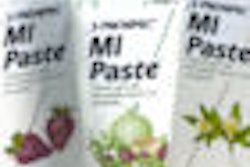
The Federal Trade Commission is reviewing a complaint by Wm. Wrigley Jr. Company that Cadbury USA does not have adequate evidence to back claims it has made in Trident Xtra Care gum ads about the oral benefits of Recaldent.
Both companies are manufacturers of competing sugarless chewing gums.
Cadbury has promoted the fact that Trident Xtra Care gum contains Recaldent, which some studies claim builds tooth enamel.
Discovered and patented by an Australian team led by Eric C. Reynolds, head of the school of dental science at the University of Melbourne, Recaldent contains casein phosphopeptides (CPP) and amorphous calcium phosphate (ACP).
"Recaldent is a powerful ingredient that actually replenishes calcium and phosphate to remineralize and protect teeth by filling in the tiny crevices where cavities can form," said Dr. Doris Tancredi, vice president of regulatory and emerging science for Cadbury Schweppes, in a press release when the gum was released. "The result is that teeth become stronger and less vulnerable to future damage."
But Wrigley takes exception to these statements. In particular, the company's complaint -- originally filed with the National Advertising Division (NAD) of the Council of Better Business Bureaus -- challenges two of Cadbury's claims:
- "... because Trident Xtra Care contains Recaldent, it actively rebuilds, protects, and strengthens tooth enamel in a way that no other sugar-free gum can!"
- "Chewing gum has never strengthened teeth like this before."
Wrigley says the claims are "inaccurate and misleading" because Cadbury has not tested the current formula of Trident Xtra against other sugar-free gums.
The company also asserts that Cadbury's studies did not prove that Recaldent contributed to any significant remineralization of teeth. Finally, the company contended that there are no studies to prove that Recaldent increases tooth strength over and above the salivary stimulation from sugar-free gum.
Skepticism about the benefits of Recaldent is not uncommon in the dental industry. Many experts have questioned its effectiveness in the process of remineralization.
In response to Wrigley's allegations, Cadbury submitted several published and unpublished studies to the NAD to support its claims. The NAD declined to release the studies to DrBicuspid.com, citing confidentiality.
Cadbury characterized Wrigley's assertions as false and maintained that their submitted materials provide more than ample substantiation for the Trident Xtra advertising claims, according to the NAD.
Reynolds co-authored two studies published earlier this year that found Recaldent to be an effective remineralization agent. The first was a review of scientific evidence that reported there is sufficient evidence to prove that Recaldent technology can significantly slow the progression of coronal caries and promote the regression of lesions (Australian Dental Journal, September 2008, Vol. 53:3, pp. 268-273).
"Hence the calcium phosphate-based remineralization technologies show promise as adjunctive treatments to fluoride therapy in the noninvasive management of early caries lesions," the review concluded.
Another study looked at the progression and regression of approximal caries in a group of adolescent subjects chewing a sugar-free gum containing 54 mg of CPP-ACP compared to a group chewing an identical gum without CPP-ACP over a 24-month period (Caries Research, May 2008, Vol. 42:3, pp.171-184).
Researchers took standardized digital bitewing radiographs at the baseline and 24-month clinical examinations.
"For subjects chewing the CPP-ACP gum the odds of a surface experiencing caries progression were 18% less than those of a surface experiencing caries progression for subjects chewing the control gum," the authors concluded. "The 54 mg CPP-ACP sugar-free gum significantly slowed progression and enhanced regression of approximal caries relative to a control sugar-free gum in a 24-month clinical trial."
Soon after the Wrigley complaint was filed, Cadbury asked NAD to dismiss the charge. It felt the NAD forum was no longer appropriate, given the inquiry by a governmental regulatory body.
"NAD is not deprived of jurisdiction simply because the challenged advertising is the subject of review from a governmental regulatory body," the organization said in an official statement. "It was the advertiser who elected not to participate in the self-regulatory process because the challenged advertising is under a concurrent regulatory review."
Cadbury and Wrigley did not return repeated calls for comments.



















